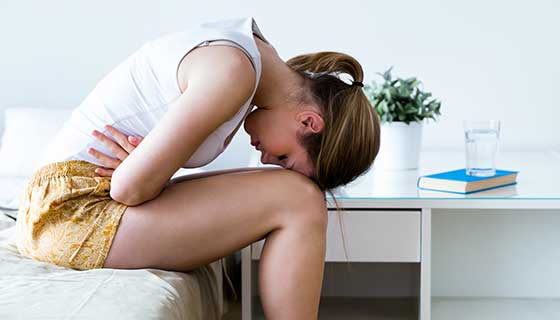
During menstrual periods, women suffer from pain but the intensity of pain differs from woman to woman. Some women feel normal pain while some have to bear intense pain which makes them helpless sometimes.
Dysmenorrhea is the term which is used in medical science to indicate the condition of painful periods. It is also termed as Menorrhagia. During periods, a woman feels cramps in her lower abdomen and thighs. The pain increases and decreases and this situation prevails during the menstrual week. Usually, the menstruation pain starts some days before the bleeding starts.
[ad#top]
The intensity of pain maximizes when the periods are heaviest. Mostly women aging between 30 – 40 years suffer from intense pain during their menstrual week. The following are the causes, symptoms, and treatment of Dysmenorrhea.
Causes
Pain during menstrual periods occurs due to the following reasons:
- The contraction of the womb’s muscular wall causes pain during periods. The women who feel intense pain suffer from stronger womb contractions.
- When the endometrial line proliferating in the womb starts shedding off during the menstrual cycle, under the influence of estrogen, via the genital tract, the women feel extreme pain. This condition is called Endometriosis.
- The growth of extra tissues in the womb line can also make your periods painful. This extra growing tissue condition is termed adenomyosis in the medical area.
- Growing of tumors that are not cancerous also causes heavy periods along with extreme pain. These tumors are familiar as Fibroids.
- When bacteria infect the womb and ovary, the inflammatory condition is created which causes pain and inflammation. This is called pelvic inflammatory disease.
The pattern of your normal menstrual pain changes when any of the above conditions prevails. This pattern change is indicated by the significant increase of pain and the longer-lasting periods than the normal duration period.
Symptoms
The period of pain in your abdomen is usually coupled with one or more of the following stated symptoms:
[ad#infeed]
- Headaches
- Diarrhea
- Sickness
- Fainting
- Tiredness
- Lightheadedness
- Vomiting
- Pain in the Lower back
- Bloating
- Fatigue
- Leg pain moving down the legs
- Irritability
Treatment
There are some options that you can use to treat and minimize menstrual pain. If the situation prevails without any betterment, then you must consult your doctor for advice and treatment. Following are the option:
- Take pain killers like aspirin when the pain starts but take it throughout the day as prescribed on the packet instructions manual.
- Get yourself active by doing proper exercise but the gentle one like swimming, cycling, or walking.
- Some general steps like heat application or self-massage can give relief.
- A healthy diet and reduction of stress are also helpful to cope up with the pain.
- Calcium supplements also help in decreasing pain.
Before opting for medications, you can try the following tips:
- Try to avoid a situation that can cause stress.
- Take a mild warm bath
- Cut down the intake of fatty foods
- Try yoga to comfort yourself
- Slow-paced walking can also help to reduce pain
[ad#matched]

This is Kyle Thomas, a professional writer, and a news editor. I started my career as a blogger who writes on various topics and then I decided that I should join a NEWS agency where I can work as a NEWS reporter. So, I joined a renowned agency in the town as an internet and after getting 2 years of experience, now I am working as a senior NEWS reporter for The Daily NEWS Times.
















